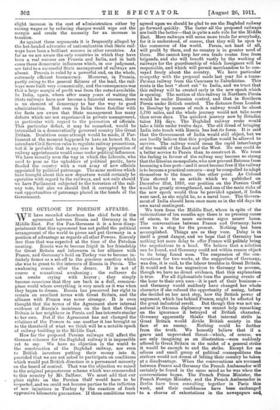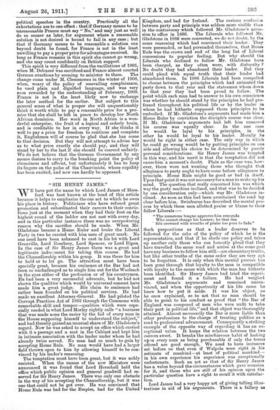THE OUTLOOK IN FOREIGN AFFAIRS.
WE have recorded elsewhere the chief facts of the agreement between Russia and Germany in the Middle East. For the Pan-Germans it is a keen disap- pointment that this agreement has not pulled the political arrangement of the world to pieces and put Germany in a position of advantage as regards all other Powers. Scarcely less than that was expected at the time of the Potsdam meeting. Russia, was to become frigid in her friendship for Great Britain and lukewarm in her alliance with France, and Germany's hold on Turkey was to become in- finitely firmer as a set-off to the gracious sanction which she was to grant to the interests of Russia in Persia. The awakening comes after the dream. It is not of course a sensational awakening ; the sufferers do not awake crying with horror ; they simply become conscious that they are back in a dull, common- place world where everything is very much as it was when they began to dream. Russia has preserved her right to remain on excellent terms with Great Britain, and the alliance with France was never stronger. It is even thought that the terms of the Agreement show internal evidence of Russia's insistence on the fact that Great Britain is her neighbour in Persia and has interests similar to her own. But if the Agreement has not changed the relations of the Powers to one another it has brought us to the threshold of what we think will be a notable epoch of railway building in the Middle East.
How far the proposed Persian railways will affect the German schemes for the Baghdad railway it is impossible yet to say. We have no objection in the world to the construction of the Baghdad railway, nor even to British investors putting their money into it, provided that we are not asked to participate on conditions which would put British directors in a permanent minority on the board of control. That was the objection we raised to the original preposterous scheme which was commended to this country by Mr. Balfour. We must add that our plain rights on the Persian Gulf would have to be respected, and we could not become parties to the infliction of new injustices in Turkey by the exaction of fresh oppressive kilometric guarantees. If those conditions were agreed upon we should be glad to see the Baghdad railway go forward quickly. The faster all the proposed railways are built the better—that is quite a safe rule for the Middle East. More railways will mean more trade for everybody, for it is understood, of course, that they will be open to the commerce of the world. Persia, not least of all, will profit by them, and no country is in greater need of them. She cannot keep her own trade routes free from brigands, and she will benefit vastly by the working of railways for the guardianship of which foreigners will be responsible, and which will permit merchandise to be con- veyed freely about the country. We have particular sympathy with the proposal made last year for a trans- Persian railway from the Caucasus to Baluchistan. This route is the best " short cut" to India, and we trust that this railway will be created early in the new epoch which is opening. The section of this railway in Northern Persia would be under Russian control, and that in Southern Persia under British control. The distance from London to Bombay by means of such a railway would be about 5,700 miles, and the whole journey would not take more than seven days. The quickest journey now by Brindisi takes 12/r days. The Baghdad railway route would take a little under twelve days. The old dread of bringing India into touch with Russia has lost its force. It is said that the Government of India would still object, but we can hardly believe that this prejudice would be allowed to survive. The railway would mean the rapid interchange of the wealth of the East and the West. No one could do a better service to Persia than to construct it. We trust the feeling in favour of the railway may become so strong that the Russian monopolists, who now prevent Batoum from becoming a free port—and it must become free if the rail way is to become a practical concern—may be compelled to adapt themselves to the times. One other point. As Colonel Yate showed in an article which we published on December 31st, 1910, our position on the Persian Gulf would be greatly strengthened, and one of the main risks of the new epoch would thus be provided against, if India were used, as she might be, as a naval base. The Govern- ment of India should have once more as in the old days its own naval contingent.
We turn from the Middle East, where in spite of the vaticinations of ten months ago there is no pressing cause of alarm, to the more ominous signs nearer home. The conversations between France and Germany. have come to a stop for the present. Nothing has been accomplished. Things are as they were. Delay is in itself a great danger, and we hope that if Germany has nothing but more delay to offer France will politely bring the negotiations to a head. We believe that a solution can be found, and Germany could not within reason object to its being found soon. The suspension of the con- versations for two weeks, at the suggestion of Germany, was due, it is said, to the labour troubles in Great Britain. It would not be too ungracious to Germany to assume, though we have no direct evidence, that this explanation is true. For all diplomatists turn the passing events of the hour to their own uses—it is part of their business— and Germany would suddenly have changed her whole character if she refused the opportunity of seeing, before she decided on her next step, how the British power of argument, which lies behind France, might be affected by the great industrial revolt. But though this was not un- natural in German diplomacy we cannot help remarking on the ignorance it betrayed of British character. Germany apparently thinks that internal strife in Great Britain would divide British society in the face of an enemy. Nothing could be farther from the truth. We honestly believe that if a grave and unprovoked threat—which, of course, we are only imagining as an illustration—were suddenly offered to Great Britain in the midst of a general strike it would be enough to end the strike. Except for an odious and small group of political cosmopolitans the strikers would not dream of letting their country be taken at a disadvantage. When the conversations are resumed between France and Germany the French Ambassador will certainly be found in the same mind as he was when the conversations began. The French Prime Minister, the French Foreign Minister, and the French Ambassador in Berlin have been consulting together in Paris this week, and their confidences have been exchanged to a chorus of exhortations in the newspapers an political speeches in the country. Practically all the exhortations are to one effect : that if Germany means to be unreasonable France must say " No," and may just as well do so sooner as later, for argument where a reasonable solution is not desired is bound to fail in any case ; but that if Germany means to be reasonable a solution can beyond doubt be found, for France is not in the least unwilling to pay a proper price for advantages received. So long as France remains in this spirit she cannot go wrong, and she may count confidently on British support. This spirit is very different from the vacillations of 1905, when M. Delcasse was sacrificed and France almost courted German exactions by seeming to minister to them. The change came under M. Clemenceau in the winter of 1908, when, weary of the policy of unavailing complaisance, he used plain and dignified language, and was very soon rewarded by the understanding of February, 1909. France is not in the least likely now to exchange the later method for the earlier. But subject to this general sense of what is proper she will unquestionably think it worth while to pay a reasonable price for a pro- mise that she shall be left in peace to develop her North African dominion. Her work in North Africa is a won- derful enterprise, the fruit of a logical and orderly brain, and is creditable to her in every way. If she thinks it well to pay a price for freedom to continue and complete it, Englishmen will of course be glad that she has come to that decision. But they will not attempt to advise her as to what price exactly she should pay, and they will stand by her to the last if she should be coerced unfairly. We do not believe that the German Government by any means desires to carry to the breaking point the policy of clumsiness and affront, but unfortunately it has to keep its fingers on the pulse of the Chauvinists, whose cupidity has been excited, and now can hardly be appeased.



































 Previous page
Previous page